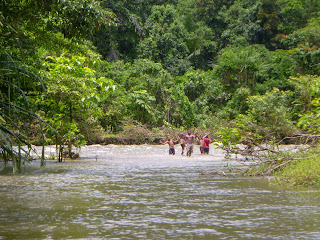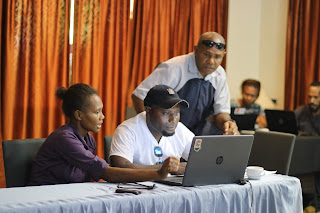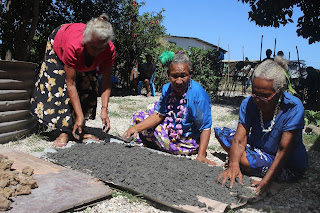Garbage-Free Kikori Collaboration
Kids enjoying themselves near Omo Village - Kikori.
‘’The Kikori River is one of my favourite places in PNG. At almost 230km long, it stretches over 23,300 km2 through the western part of
Gulf Province in Papua New Guinea, forming a magnificent delta that reaches down to the Gulf of Papua. It is intensely remote, with dense mangrove forests lining the interweaving waterways, and small villages appearing along the river
banks,’’ says Yolarnie Amepou, a young biologist who is currently heading the Piku Biodiversity Network in the Western end of Gulf province.
A common sight along the river bank - Kikori. ‘’The villagers live predominantly off fish and sago, banana, and are complemented by sweet potatoes, cassava among other vegetables. The people here live humble lives, their stilted wooden huts line the river banks and their dugout canoes paddle softly along the water. There is certainly magic in these waters, a calmness, a soothing, and it is without a doubt one of the most beautiful places in the world’’, added Ms. Amepou.
A waterfall at Omo Village. It is the country’s fifth-largest river and home to animals and plants found nowhere else in the world. Home to numerous tribal groups, a snapshot of the cultural diversity that Papua New Guinea has to offer. The Kikori River connects them all, providing them a path of travel, a garden of food, storage of various marine and freshwater resources sustaining them, and their livelihoods into the future as it did for their people before them.
A hamlet along the river banks. Amongst the many different wildlife in the Kikori Delta is the Pig-nosed Turtle, Yes the pig-nosed turtle is found on the country’s 5toea coin and is found in the Kikori Delta. Piku, is an important source of food, income, and a cultural symbol of the River people. The Piku Biodiversity Network formally established as an NGO in 2017 after 30 years of Piku research along the Kikori River and 12 years of working to establish its local network, engaging with over 23 villages and the many tribes that inhabit this paradise. In February 2019 the youth of Kikori through the Kikori Youth Development Association took on the initiative to tackle the growing problem of household garbage in and around their river environment, bringing to life an idea of one of the PBN’s initiative, The Piku Project. The Piku Project is funded by Exxon Mobil PNG. The Initiative named ‘’The Garbage-Free Kikori Collaboration or simply the “GFKC’’, brought youths from different clans, villages, and tribes to work towards a common goal, and that is the cleaner healthier garbage-free Kikori River.
Yolarnie front from right with some of the youths.
In partnership with The Piku Biodiversity Network (PBN), Community Development Initiative (CDI) Foundation Trust Fund, and The Voice Inc were able to develop programs to assist the youths to carry out the garbage campaign. They were taught how to conduct waste audits, build platforms to collect, sort, count, and weigh this garbage.
Members of GFKC sorting and auditing waste collected. ‘’It is waste audit data that is needed to inform waste management plans, the Kikori River like many rural PNG communities has no waste management plan. The GFKC has taken on the challenge to rectify this by assisting their local members and Local Level Government in the first step towards a management plan and waste audits.’’ ‘’There are over 10 platforms in Kikori urban for garbage collection awaiting routine waste audits. There have been public demonstrations and awareness on the issue of garbage as the youth try to educate the wider community, said Ms. Amepou’’ “When Yolarnie first told us that we were going to do a waste audit, we didn’t think we could do it. The only other youths that did the waste audit were University students in Port Moresby. Most of our youths left school in Primary School, it sounded very hard. We did the first waste audit with Yolarnie and CDI and saw it was easy, so we embarked on doing the second waste audit ourselves.” Kikori Youth Development Association chairman, Mr. Ernest Dai Dobson stated proudly.
Weighing the Waste that have been collected and sorted.
‘’They (GFKC) are working towards achieving their ambitions and it is hoped that the campaign will be celebrated this year with a youth-led World Environment Day celebration on June 5th, 2020. The Kikori youth are making a stance of ownership in creating the type of environment they would like to live in, believing that a change in the way the Kikori community lives must begin with action today,’’ says Ms. Amepou The GFKC is also about youth empowerment and providing youth an opportunity to step up and step out, to showcase their potential and learn the importance of collaboration as well as demonstrate the strength of cultural diversity when it works towards a common goal. The ten urban settlements in Kikori are currently piloting the GFKC under the leadership of Ernest Dai Dobson. “It’s a perfect application for PNG’s Fifth National Goal and Directive Principle; ‘Papua New Guinean ways’ and a project that challenges other rural youths elsewhere in the country that if Kikori Youth can stand up to make a change in their communities, so can you!”. ‘’The GFKC 2020 Program planned to include over 23 villages from over 7 Tribes and language groups along the Kikori River, as well as nine (9) schools. It will include youth teams, Community-based organizations, and guests from visiting organizations over three months of activities’’, alluded Ms. Amepou.
By 2020, GFKC is aiming at achieving locally trialed and safe waste management protocol for Kikori communities developed by the youth themselves. Mr. Ernest Daii Dobson, is thankful to the partners and contributors of the GFKC and local community leaders like the town mayor Mr. Vaii William, Community Policing Officers under the supervision of Sargent Della, the West Kikori LLG President, Councilor Surabi and Local Ward Councilors for their support so far.
Kikori children learning about waste. The GFKC participants have been overwhelmed with the support they have received it. The latest addition to the collaboration has been the Digicel Foundation has contributed substantially towards providing Personal Protective Equipment for youth participants. The GFKC has received and is grateful for contributions in kind from Exxon Mobil PNG, City Pharmacy Limited, the PNG Australia Alumni Association, the Conservation Environment Protection Authority (CEPA), Charles Darwin University, and the University of Canberra, Delta Store Kikori Limited, Kikori Hospital under the care of Gulf Christian Services as well as friends and supporters of the project including local Kikori urban community and schools.
Taking a breather after a long day.
END!!
Pictures supplied by Yolarnie Amepou - PBN.
A common sight along the river bank - Kikori. ‘’The villagers live predominantly off fish and sago, banana, and are complemented by sweet potatoes, cassava among other vegetables. The people here live humble lives, their stilted wooden huts line the river banks and their dugout canoes paddle softly along the water. There is certainly magic in these waters, a calmness, a soothing, and it is without a doubt one of the most beautiful places in the world’’, added Ms. Amepou.
A waterfall at Omo Village. It is the country’s fifth-largest river and home to animals and plants found nowhere else in the world. Home to numerous tribal groups, a snapshot of the cultural diversity that Papua New Guinea has to offer. The Kikori River connects them all, providing them a path of travel, a garden of food, storage of various marine and freshwater resources sustaining them, and their livelihoods into the future as it did for their people before them.
A hamlet along the river banks. Amongst the many different wildlife in the Kikori Delta is the Pig-nosed Turtle, Yes the pig-nosed turtle is found on the country’s 5toea coin and is found in the Kikori Delta. Piku, is an important source of food, income, and a cultural symbol of the River people. The Piku Biodiversity Network formally established as an NGO in 2017 after 30 years of Piku research along the Kikori River and 12 years of working to establish its local network, engaging with over 23 villages and the many tribes that inhabit this paradise. In February 2019 the youth of Kikori through the Kikori Youth Development Association took on the initiative to tackle the growing problem of household garbage in and around their river environment, bringing to life an idea of one of the PBN’s initiative, The Piku Project. The Piku Project is funded by Exxon Mobil PNG. The Initiative named ‘’The Garbage-Free Kikori Collaboration or simply the “GFKC’’, brought youths from different clans, villages, and tribes to work towards a common goal, and that is the cleaner healthier garbage-free Kikori River.
Yolarnie front from right with some of the youths.
In partnership with The Piku Biodiversity Network (PBN), Community Development Initiative (CDI) Foundation Trust Fund, and The Voice Inc were able to develop programs to assist the youths to carry out the garbage campaign. They were taught how to conduct waste audits, build platforms to collect, sort, count, and weigh this garbage.
Members of GFKC sorting and auditing waste collected. ‘’It is waste audit data that is needed to inform waste management plans, the Kikori River like many rural PNG communities has no waste management plan. The GFKC has taken on the challenge to rectify this by assisting their local members and Local Level Government in the first step towards a management plan and waste audits.’’ ‘’There are over 10 platforms in Kikori urban for garbage collection awaiting routine waste audits. There have been public demonstrations and awareness on the issue of garbage as the youth try to educate the wider community, said Ms. Amepou’’ “When Yolarnie first told us that we were going to do a waste audit, we didn’t think we could do it. The only other youths that did the waste audit were University students in Port Moresby. Most of our youths left school in Primary School, it sounded very hard. We did the first waste audit with Yolarnie and CDI and saw it was easy, so we embarked on doing the second waste audit ourselves.” Kikori Youth Development Association chairman, Mr. Ernest Dai Dobson stated proudly.
Weighing the Waste that have been collected and sorted.
‘’They (GFKC) are working towards achieving their ambitions and it is hoped that the campaign will be celebrated this year with a youth-led World Environment Day celebration on June 5th, 2020. The Kikori youth are making a stance of ownership in creating the type of environment they would like to live in, believing that a change in the way the Kikori community lives must begin with action today,’’ says Ms. Amepou The GFKC is also about youth empowerment and providing youth an opportunity to step up and step out, to showcase their potential and learn the importance of collaboration as well as demonstrate the strength of cultural diversity when it works towards a common goal. The ten urban settlements in Kikori are currently piloting the GFKC under the leadership of Ernest Dai Dobson. “It’s a perfect application for PNG’s Fifth National Goal and Directive Principle; ‘Papua New Guinean ways’ and a project that challenges other rural youths elsewhere in the country that if Kikori Youth can stand up to make a change in their communities, so can you!”. ‘’The GFKC 2020 Program planned to include over 23 villages from over 7 Tribes and language groups along the Kikori River, as well as nine (9) schools. It will include youth teams, Community-based organizations, and guests from visiting organizations over three months of activities’’, alluded Ms. Amepou.
By 2020, GFKC is aiming at achieving locally trialed and safe waste management protocol for Kikori communities developed by the youth themselves. Mr. Ernest Daii Dobson, is thankful to the partners and contributors of the GFKC and local community leaders like the town mayor Mr. Vaii William, Community Policing Officers under the supervision of Sargent Della, the West Kikori LLG President, Councilor Surabi and Local Ward Councilors for their support so far.
Kikori children learning about waste. The GFKC participants have been overwhelmed with the support they have received it. The latest addition to the collaboration has been the Digicel Foundation has contributed substantially towards providing Personal Protective Equipment for youth participants. The GFKC has received and is grateful for contributions in kind from Exxon Mobil PNG, City Pharmacy Limited, the PNG Australia Alumni Association, the Conservation Environment Protection Authority (CEPA), Charles Darwin University, and the University of Canberra, Delta Store Kikori Limited, Kikori Hospital under the care of Gulf Christian Services as well as friends and supporters of the project including local Kikori urban community and schools.
Taking a breather after a long day.
END!!
Pictures supplied by Yolarnie Amepou - PBN.













Comments
Post a Comment